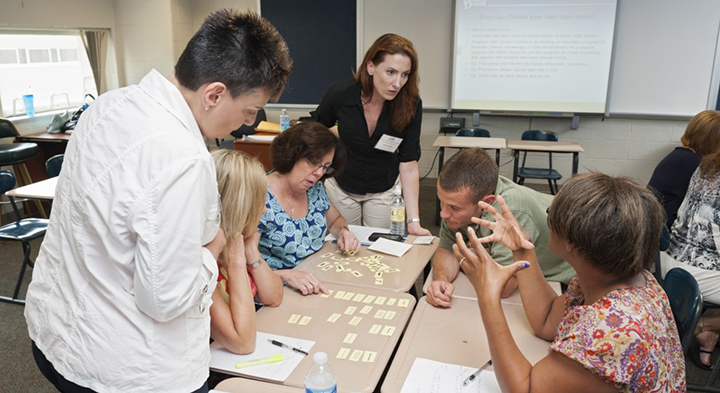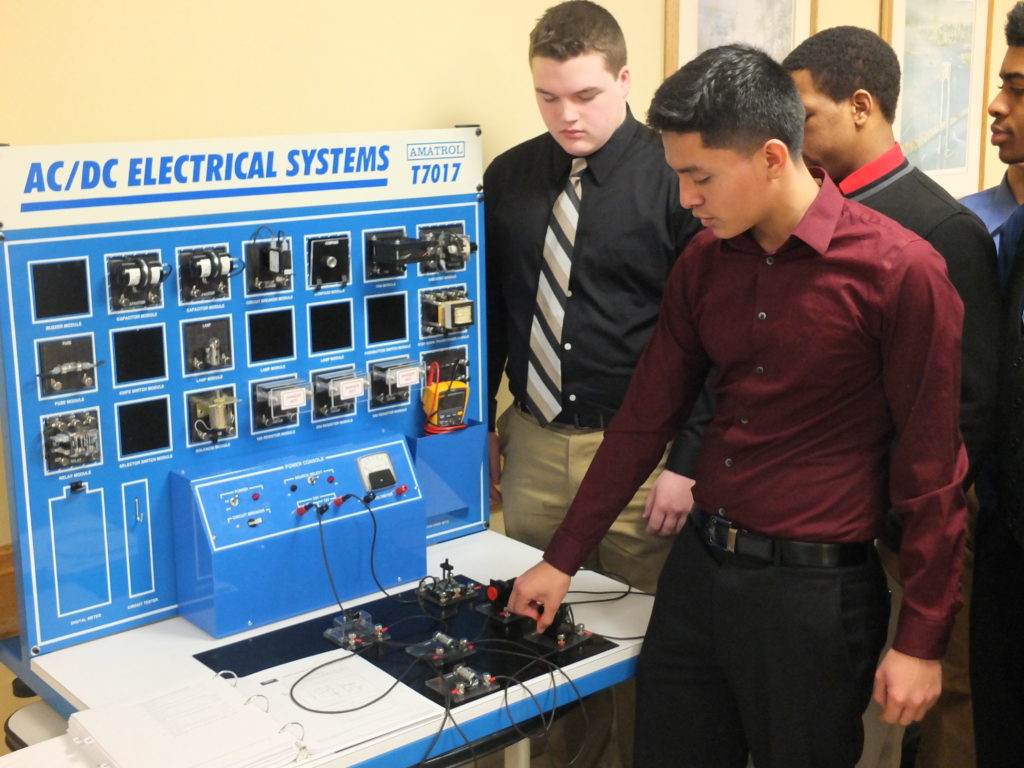10 Education Stories to Watch in 2017
Every new year brings with it a sense of transition and opportunity—a chance for a fresh start or reinvention. But even by typical standards, 2017 could be very interesting for the world of public education. Major change is in the air—from the change in the White House, to new local leaders, to policy issues that could send ripples throughout Delaware.
The team at Rodel has examined the tea leaves and compiled its 10 education issues to watch in 2017. Read on, and share yours.
Appealing for Basic Tech Infrastructure
According to Education Superhighway, only 52 percent of schools in Delaware are truly wired with enough broadband for digital learning today. To meet 2018 demand, the typical school district in Delaware will need to grow bandwidth at least threefold. When the Educational Technology Task Force assembled last year, infrastructure and leadership topped their wish-list. As technology integrates further into our daily lives (and often separates low-income students from wealthier peers as a learning tool), and as the consensus of support grows among district and state leaders, 2017 could be the year Delaware dives in on tech enhancements—in spite of a challenging budget environment. [Read: Upgrading Our Education Technology; Student-Centered Learning Structures]
School Voucher Proposals
Like many other observers have pointed out, incoming U.S. Secretary of Education Betsy DeVos likely has many hurdles to overcome if she plans on instituting a school voucher plan nationwide. But it’s certainly worth watching how it unfolds as the Trump cabinet settles in later this month. Federal prioritization of laissez-faire school choice policies could catalyze local interest, and possibly a renewed appetite for Education Savings Accounts. Here in Delaware we have our share of questions about whether vouchers would serve our 136,000 students across the state equitably, including low-income, English learner, and special education students. [Read: What Will President-Elect Trump’s Education Agenda Mean for Delaware?]
Changing Leadership
Donald Trump and Betsy DeVos aren’t the only new sheriffs in town. Delaware’s new governor, John Carney, gets sworn in this month, and we’re anticipating the confirmation of a new Secretary of Education, Susan Bunting—the longtime superintendent of the Indian River School District. Gov. Carney will also inherit a State Board of Education with one vacant seat, to which he’ll need to appoint a nominee for the State Senate to approve. This year will also mark an end of an era for DSEA president Frederika Jenner and vice president Karen Crouse, whose terms are up. Voting for those and other executive positions in the state’s influential teachers union runs through January 23. And as an added wild card: The State Senate will hold a special election for Bethany Hall-Long’s seat, as she will be sworn in as our next lieutenant governor. Should a republican win the seat, it will mark a shift in power to the GOP, and a potential change to the chair of the Senate Education Committee. With this much change, there’s bound to be some ripples in the education policy world. [Read: 15 Facts about Dr. Susan Bunting]
State Plan and Potential Lift of Charter Moratorium in Wilmington
In spring of 2015, Delaware lawmakers placed a moratorium on new charter schools in Wilmington until the completion of the Strategic Plan for Specialized Educational Opportunities. That growth plan has been in the works for the last few years and later this month the committee has one final meeting in which they will discuss recommendations from the Enrollment Preferences Task Force prior to completing their report. Will the moratorium be lifted? Given some recent tensions and lawsuits around issues like charter school funding, finance, and recruitment policies—charter schools could remain in the headlines in 2017. [Read: SREO report; Wilmington, the city with too many charter schools]
Realizing the Potential of Special Education
Around 14 percent of Delaware’s public school students are identified as “special education” and receive Individualized Education Plans (IEPs) to support their academic success in school. Persistent gaps in state test scores, high school graduation rates, and college remediation rates suggest that we’ve yet to unlock the full potential of many special education students. Sometime in 2017, a statewide strategic plan to address the current inequities in special education is anticipated. How it’s received by parents and practitioners—and the plan’s subsequent implementation—will certainly be hot issues in the months to come. [Read: Federal IDEA 2016 Delaware State Performance Plan/Annual Performance Report]
Expanding Teachers Leadership Opportunities
Teachers and leaders are the two most important in-school factors impacting student learning. Education leaders and policymakers have sought ways to keep great teachers in the classroom and provide them career advancement without becoming administrators. The state’s Committee to Advance Educator Compensation & Careers last year formed an educator work group that eventually developed the first Teacher-Leadership Pilot program. Ultimately, 19 teachers were selected to fill five new teacher-leader roles to support educator career paths and inform instructional practice. Once the “pilot” training wheels are off in a few months, we’ll know more about the program’s future—from its longevity to its impact and more. [Read: 19 Delaware teachers piloting Teacher Leader roles during 2016-17]
Each year the number of Delaware students living in poverty grows, as does the number of students learning English. And each year Delaware’s 70-year-old school funding system falls further behind in its ability to support student needs. Last year we witnessed strong demand for an updated school funding system from groups across the state including the Wilmington Education Improvement Commission, the Wilmington Education Strategy Think Tank, and a coalition of 22 organizations committed to excellent and equitable education opportunities for all Delaware students. And a bill has been filed to provide state funding for basic special education in grades K-3 (a notion that’s supported by WEIC). As a new gubernatorial administration and General Assembly prepare their agendas, we will advocate for increased resources for students with greater needs and transitioning to a student-based system. [Read: No Fair Deal with Delaware’s Antique Funding System; Education Equity Delaware website]
Preparing Students to Thrive Beyond High School
Some economists predict that by 2020, 65 percent of jobs will require education beyond a high school diploma (like a professional certification, a two-year degree, or a four year degree). Myriad efforts are underway in Delaware to prepare students for a bright future after high school ends. Chief among them is Delaware Pathways, which for three years has worked to increase postsecondary opportunities for students by providing them with early career and college experience in high-need industries. In the fall of 2014, there were just 27 young people enrolled in an advanced manufacturing pathway. Delaware has scaled quickly with over 5,000 young people in over 14 state model pathways this school year. 2017 should be a big year for Pathways: The state recently received $2 million from J.P. Morgan Chase to expand its work, the national Pathways to Prosperity Network will showcase Delaware’s progress at its biannual conference in March, and a case study will be released by Harvard later this spring examining the great work in our state. [Read: A Jolt of Blue-Collar Hope; Delaware’s career pathways program lands $2M grant]
Improving School Safety
In 2016, school safety and bullying made headlines amidst the tragic deaths of 16-year-old Amy Inita Joyner-Francis and 15-year-old Brandon Wingo, who were both students at Howard High School of Technology. In response, lawmakers formed a School Safety Task Force, which in turn released a series of recommendations. Some made a lot of sense—such as increasing the number of mental health professionals in schools, and improvements on school climate. Other recommendations came with some concerning baggage, like the recommendation of a cell phone ban in Delaware schools. Some local teachers took umbrage with the report, and instead called for a more data-driven and student-centered approach to schools safety. Governor-elect Carney put forth some safety recommendations in his Criminal Justice policy plan, including expanding after-school programs, and requiring school attendance for students until the age of 18 (a bill on increasing the compulsory age has already been filed). [Read: Teachers weigh in on school safety report]
Strengthening Transparency and Improving High-Need Schools
The acronym that will be on the tip of everyone’s tongue in 2017: ESSA. Delaware is in the process of writing its Every Student Succeeds Act (ESSA) state plan, which it will submit to the U.S. Department of Education in April. This plan will determine minimum requirements for education reporting and transparency, as well as improvement plans and expectations for the state’s lowest performing schools, among other provisions. Turnaround strategies for low-performing schools was also hotly debated by WEIC and we imagine those debates will continue.
Delaware teachers weighed in with their recommendations late last year, and various community groups have signed a letter on reporting. Will Delaware maximize the ESSA opportunity to strengthen transparency, reporting, supports to schools, and expand our indicators of success? More importantly, what will state or district leaders do to help schools improve?[Read: Opportunities for Delaware under the Every Student Succeeds Act; The Every Student Succeeds Act: Background and Key Questions]









